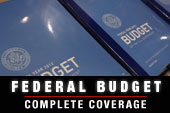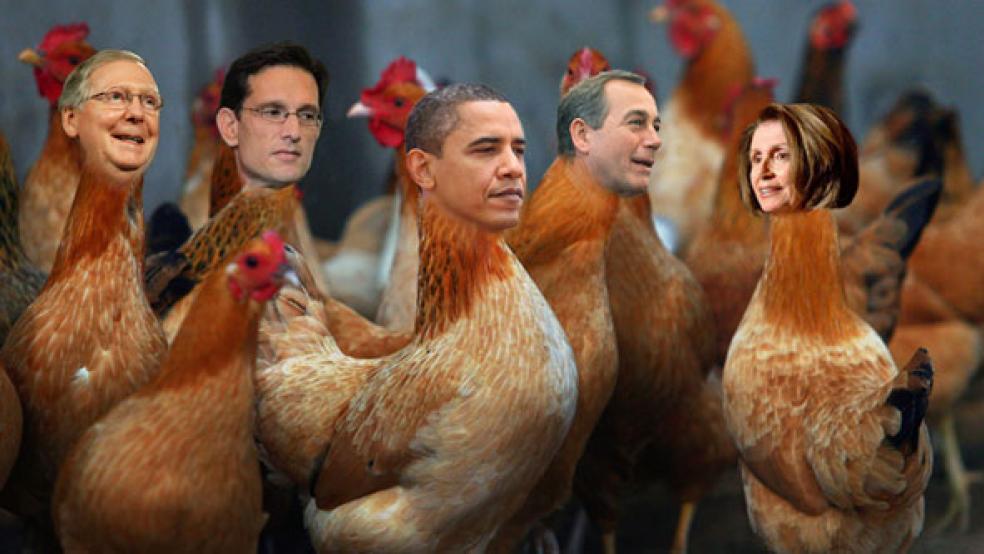For the past six weeks, we’ve certainly heard plenty of hysteria over the upcoming sequester cuts, which take effect at the end of the week. If we rolled the scare stories into a script, we could title it Nightmare on Sequester Street. President Obama has traveled thousands of miles to sound the alarm over the cuts, which he now claims will cost hundreds of thousands of jobs -- over 5200 miles in travel just over the last two weeks. With Air Force One’s cruising speed of 575 MPH, Obama has spent $1.6 million in the air alone fighting the spending cuts of the sequester.

Cabinet members have made appearances on television shows all month long to sing from the same hymnal. Transportation Secretary Ray LaHood told a very skeptical Candy Crowley on CNN’s State of the Union on Sunday that the sequester will severely disrupt air-traffic control in FAA towers. Crowley pointed out that the sequester would only reduce funding to 2008 levels in real dollars and still would get more this year than last, and that we have over 25 percent fewer domestic flights now than we did before 9/11.
Janet Napolitano claimed Monday that cuts to the Department of Homeland Security would leave America vulnerable to terrorism and illegal immigration. It’s worth noting that, as Cato pointed out after Napolitano’s horror story on Monday that Border Patrol funding has risen 750 percent over the last 24 years, and the size of the department has grown sixfold.
Most of the claims are absurd, as Crowley demonstrated in real time. (LaHood’s response to Crowley’s interrogation? “Budgets go up and down.”) Defense is the one area where actual and significant reductions in spending will take place rather than just cuts to previous increases in spending, and even those are temporary. Spending on defense drops from a requested $645 billion to $603 billion for FY2013 (roughly FY2007 levels), and then drops again to $588 billion in FY2014 according to the CBO.
However, defense spending then ramps back up to $632 billion by FY2017 and $695 billion by FY2021 – a 15 percent increase in less than a decade, even with the sequester in place. We would probably hear more scare stories about the Pentagon, except that Obama’s choice of defense-spending skeptic Chuck Hagel as Defense Secretary shows that this is one area where the White House wants the cuts to take effect, at least in some manner.
But what if this isn’t about the sequester at all?
Consider the oddly recent and frenzied Texas Chainsaw Sequester panic in the past few weeks. Josh Boak’s column here at The Fiscal Times reviews Bob Woodward’s reporting on the sequester deal, which clearly shows that the idea for the automatically-triggered cuts came from the White House – and just as clearly showed that Obama expected Republicans to stop it.
With their backs against the wall and having lost the first battle of the year with Obama over tax rates, the House GOP decided to push forward with spending cuts any way they could get them and refused to rescind the sequester. This apparently came as a big surprise to Obama and his advisers, who only recently realized that Republicans weren’t bluffing about getting spending cuts after having given in on tax rate increases rather than the broader tax reform they wanted--even if the cuts are mainly to the rate of increase in spending rather than actual baseline reductions.
Even with the surprise, the amount of hysteria combined with Obama’s ownership of the strategy is disproportionate to the effects. Democrats began to openly worry about the messaging from the White House this week, fretting that an anti-climax after the sequestration hit would end up leaving egg on their faces. If all of the horror stories turned out to be a big bust, then Republicans would be able to say, “We told you the world wouldn’t end if we cut spending!” That would leave them in a stronger position for further cuts.
Or would it? Just as Republicans decided to put the loss of the fight over the Bush-era tax rates behind them and ride the sequester to win the next round, the Obama administration may be doing the same in this round. After all, the tables had turned to allow the GOP to do nothing to get its way, just as Obama did with all of the tax rates expiring on New Years Day two months ago.
The White House may have been surprised to see their opponents taking the substantial hit to Defense to win this round, but had to have seen that they couldn’t do anything about it – not without tipping their hand on the expiration of the continuing resolution (CR), which takes place on March 27th. After that, the federal government has no budget, and without a new CR or final budget, the government will be forced to shut down.
And this is the real fight. The stakes will be the highest for both parties in a government shutdown, and both parties have reasons to avoid the fight. Neither has an advantage in expiration dates. The rubber game of chicken will be a straight-up battle of nerves … and public relations.
In that arena, the histrionics over the paltry sequester trims serve Obama’s purposes. If the public perceives the GOP to have won a big fight by keeping the sequesters in place, that puts more pressure on House Republicans to compromise on the next continuing resolution. If people don’t see an immediate impact from the sequester, they still will be open to the idea that we can’t go much further in spending reductions without risking real damage. Those small reductions that generate anger and backlash against either or both parties will tend to hurt the Republicans more in 2014, since they have to defend their House majority in 435 districts, while Democrats will only have to protect their Senate majority in 33 states. If Obama can create austerity fatigue with this sequester hysteria, Republicans will find themselves in serious trouble next year.
The effort to impose budget discipline has to come in the next four weeks. The end of the current CR means both parties have another chance to push their budgetary policies, and can also adopt, modify, or eliminate the sequester. While Obama has the GOP playing defense on the sequester with demagogic claims over its supposedly disastrous cuts, he’s shaping the battlefield for the fight that counts – the rubber game of fiscal-cliff chicken that will settle all accounts.






